Scientist of the Day - Jorge Luis Borges
Jorge Luis Borges, an Argentinean author (and librarian), was born Aug. 24, 1899. Borges was a captivating writer, publishing mostly short pieces that combined the genres of short story and essay in a unique Borgesean manner where it is difficult to sort out fact from fiction. He was astonishingly well-read, citing all manner of ancient and modern sources in a variety of languages. As he himself admitted, he read widely in order to stimulate his own writing and made no claims to great erudition. Nevertheless, you will be astonished at what you do not know when you read one of his essays.
Borges often wrote about or touched on scientific matters in both his short stories and his essays. I was a little surprised to discover that I have referred to Borges four times already in these posts – in my pieces on Franz Kafka, Michel Foucault, Omar Khayyam, and Olaf Stapledon, discussing in passing Borges' essays on Kafka, Edward Fitzgerald, and John Wilkins.
One of Borges' favorite observations was that, when you read someone's book, it is not the book that the author wrote, for you bring to it your own life experience, and illuminate it with all the other books you have read. That is the theme of "Kafka and his Precursors," which we discussed in our post on Kafka, and of one of his most famous ficciones, "Pierre Menard, author of the Quixote," in which a man rewrites Cervantes’ celebrated Don Quixote, word for word, and what emerges is a completely different book. The idea also appeared in one of my favorite essays, “Averroes’ Search.” Averroes was a medieval Spanish Muslim commentator on Aristotle, and Borges wrote about how perplexed Averroes was when he came across the terms tragedy and comedy in Aristotle's Poetics, because Averroes had never seen a play, nor had any idea of what a play is, and his efforts at enlightenment were frustrating, because drama was outside the experience of any Muslim of his time. Borges then commented that, if Averroes did not have the experience to understand Aristotle, how was I (Borges) to understand Averroes, since our life experiences have nothing in common except books.
Two other themes that attracted Borges were the idea of the infinite’s relation to the finite, and the idea that there were only a few metaphors in the world, recycled again and again. Both motifs, as well as the theme of “Averroes’ Search,” emerge in Borges’ essay, "Pascal's sphere", which discused Pascal’s lament that "Nature is an infinite sphere, whose center is everywhere and whose circumference is nowhere." The thought terrified Pascal, but Borges showed not only that the metaphor is an old one, dating back to antiquity, but that in other eras, it produced different reactions. Giordano Bruno was exhilarated by an infinite universe, liberated from the confines of the old geocentric cosmos. Nicholas of Cusa was contemplative, dealing with the observation in a mathematical way, and the ancient (and mythical) sage, Hermes Trismegistus, saw it as a paradox. The problems of the infinite also emerged in Borges' essay "Avatars of the Tortoise," which dealt with the problems of Zeno's second paradox, which claims that, if the hare is given a head start, Achilles will never catch it, because it would take an infinite number of steps to do so.
Borges, not surprisingly, was fascinated by language, and by the age-old idea that it is possible to have a language in which the symbols are not conventional, but are ideas and essences themselves, so that the mere use of language would convey and impart meaning embedded in the symbols. In an essay called "The analytical language of John Wilkins," he examined Wilkins’ attempt to create a universal language in which the symbols are chosen so that a word will convey its meaning just from those symbols. For example, using Wilkins’ alphabet, de at the beginning of a word means element, deb means the first element, fire, and deba means a subset of fire, a flame. Another word might tell you, just from its letters, that something is an animal, four-footed, carnivorous, and brown. Borges concluded that such schemes as Wilkins’ are the result of the human attempt to understand the universe and its meaning, and are doomed to failure, because we have no idea what the universe is. It is in this essay that Borges puckishly discussed a classification system which he says he found in a “certain Chinese encyclopedia”. We quoted the entire passage in our post on Foucault, and it will make you laugh in bemused delight.
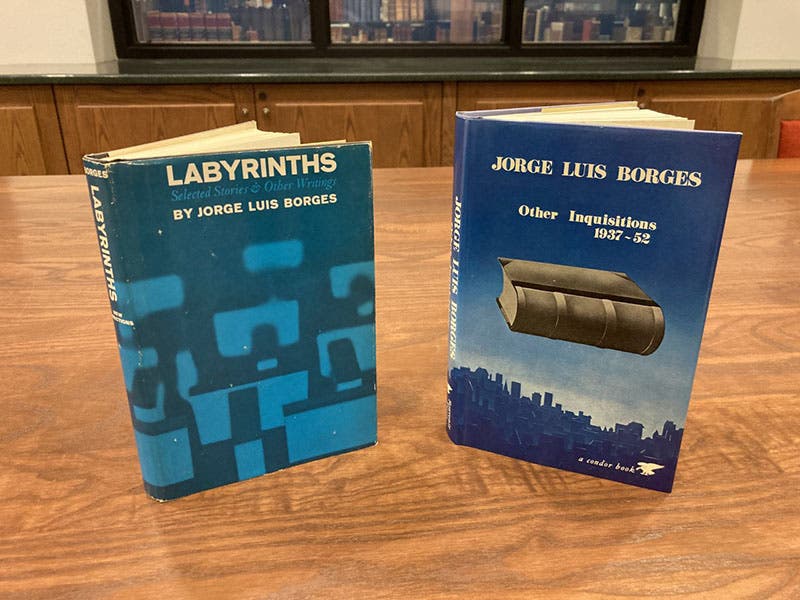
The first English-language edition of Jorge Luis Borges, Labyrinths, 1962, and the first British edition of Other Inquisitions, 1937-52, 1973 (author’s copies)
Borges’ essays and stories were written in Spanish and collected together in several Spanish publications, most notably Otras Inquisciones (1952) and Ficciones (1944, 1956). Not until 1962 were any of these books translated into English. One of the first was Labyrinths: Selected Stories and Other Writings (1962), which contained essays and stories from a variety of earlier Borges publications, and it was closely followed by Other Inquisitions (1964). There is some overlap, but between the two books, you can find every piece that we have referred to today or in our previous posts (third image). If you have never read Borges, I encourage you to do so. It is amazing what he can pack into three or four pages, and how he can please and provoke in the same sentence. In my opinion, he is one of the great writers, and thinkers, of the 20th century.
Borges was director of the National Library of Argentina in Buenos Aires from 1955 to 1973, when Peron took power and Borges resigned. He had slowly become blind, losing his sight completely in 1955, but it didn’t seem to slow him down. He died in Geneva in 1986 and is buried there (fourth image). There is a sculpture of Borges, seated on a bench, near the library, but I much prefer the bust by Juan Carlos Ferraro that sits in the Cafe Tortoni in Buenos Aires (first image).
Dr. William B. Ashworth, Jr., Consultant for the History of Science, Linda Hall Library and Associate Professor emeritus, Department of History, University of Missouri-Kansas City. Comments or corrections are welcome; please direct to ashworthw@umkc.edu.

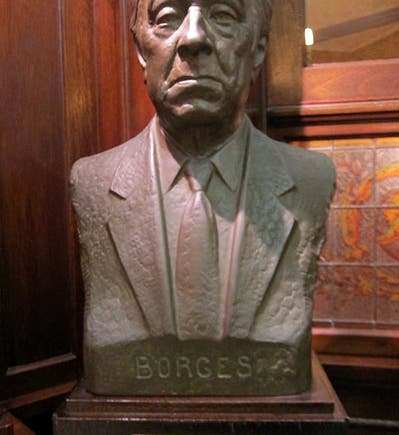
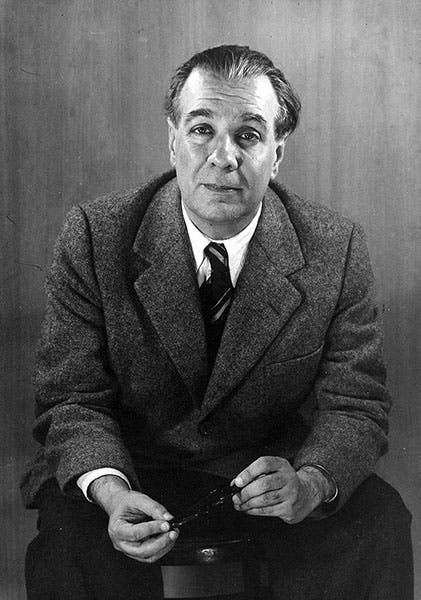
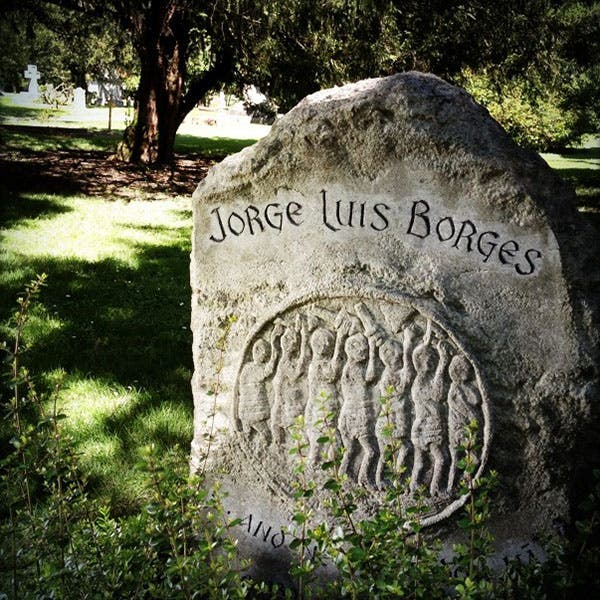
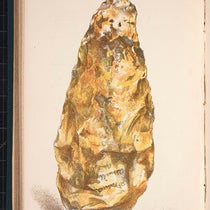

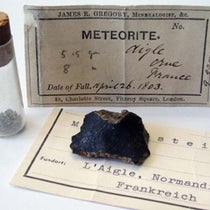
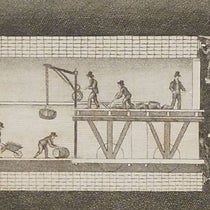
![“Aurora Borealis,” hand-colored wood engraving by Josiah Wood Whymper, [Natural Phenomena], plate 2, 1846 (Linda Hall Library)](https://assets-us-01.kc-usercontent.com:443/9dd25524-761a-000d-d79f-86a5086d4774/0245ffcb-b70c-477c-8792-0a73ebd54eb2/Whymper%2011.jpg?w=210&h=210&auto=format&fit=crop)